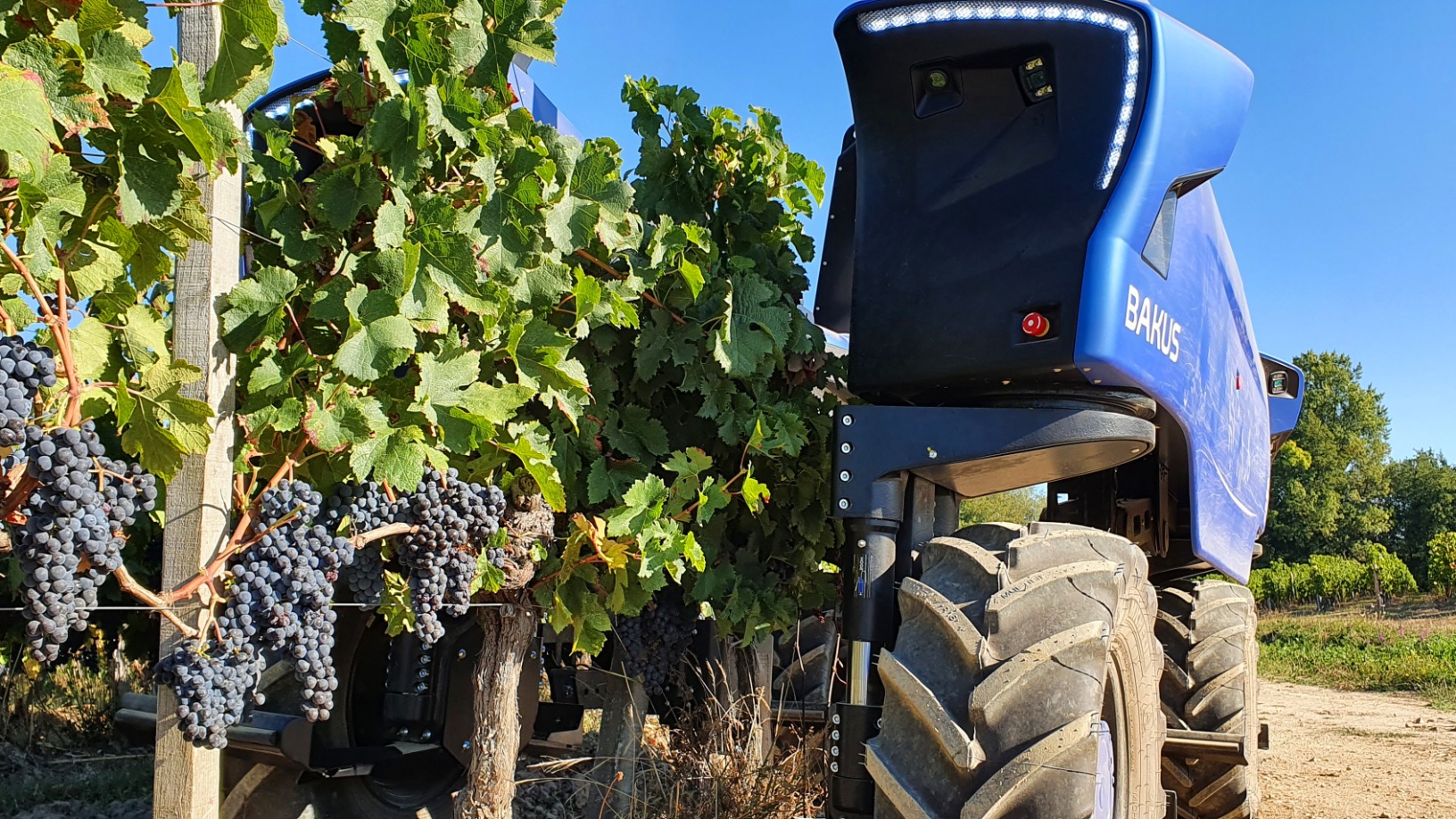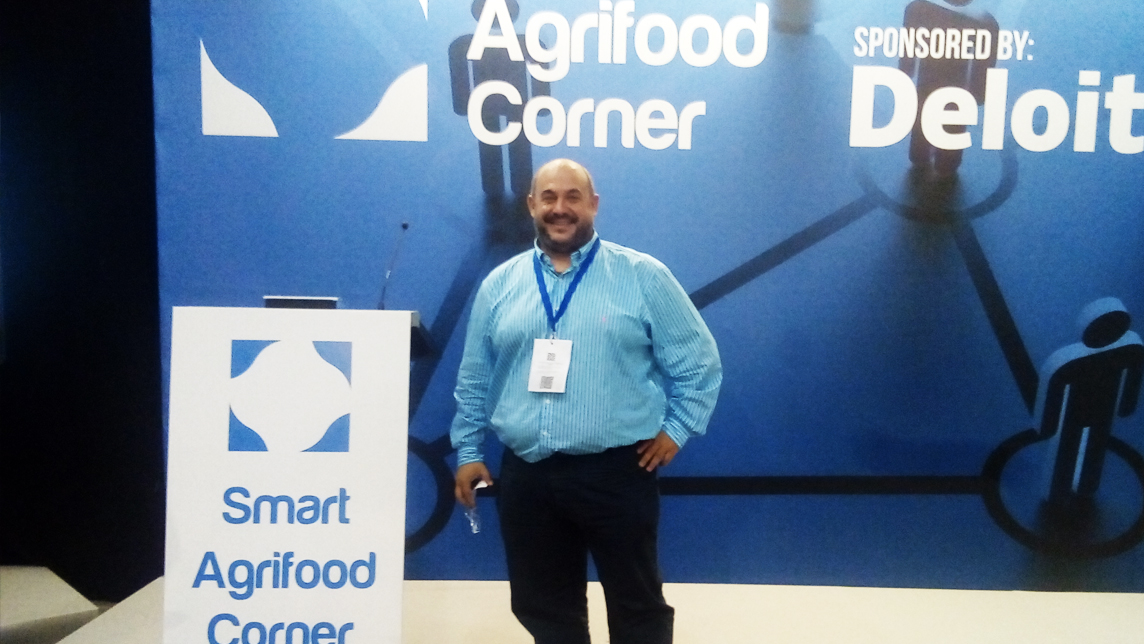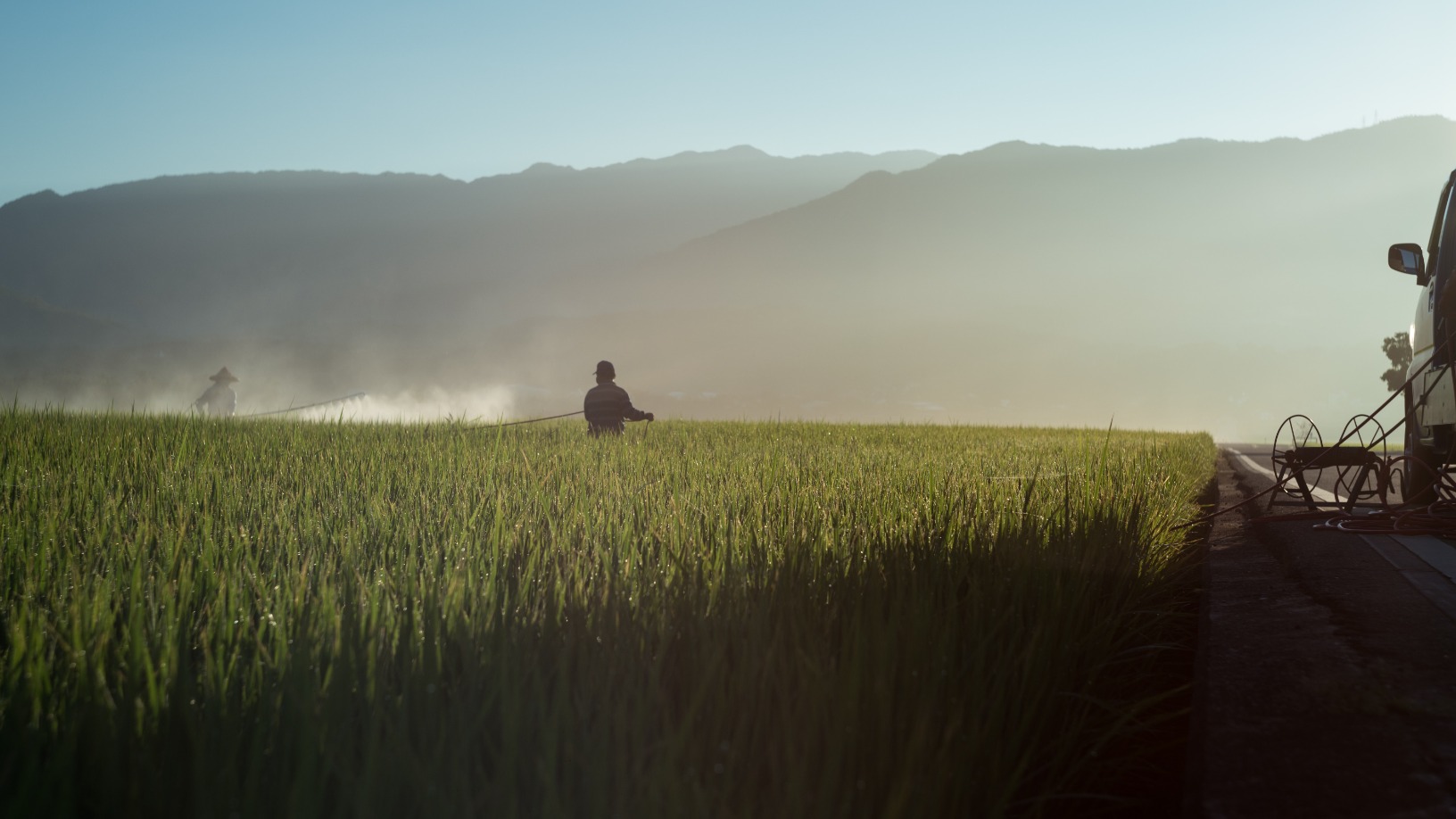A year after the first sale of its Bakus robot, French agritech startup VitiBot recently raised €11m in Series A funding, with some of France’s largest wine and spirits companies as investors. The Champagne-based company — whose mission is to bring greater efficiency, sustainability and safety to the winemaking industry — plans to use the funds to grow its business at home and abroad.
Backing Vitibot in the October round were Champagne Roederer; Martell Mumm Perrier-Jouët, a subsidiary of the CAC 40-listed Pernod Ricard Group; Champagne Laurent-Perrier; Piper-Heidsieck and Charles Heidsieck, as well as Bpifrance (Banque Publique d’Investissements), the French public investment bank established in 2015 to support entrepreneurs.
Founded in 2016 by Cedric Bache and his father Dominique Bache, Vitibot rolled out its first robot in September 2017, with the first commercial sale booked in 2019. The startup quickly attracted the attention of both the industry and industrial investors, raising €3m in seed funding in 2018 from local winegrowers, cooperatives, Champagne houses and industrial partners. This enabled it to secure factory space in Reims — the heart of France’s champagne region — for its production and development premises. The funds also enabled VitiBot to begin commercial production of the Bakus, with the first robot sold in 2019.
Named for the Roman god Bacchus who is often depicted holding a bunch of grapes, the Bakus autonomous straddle robots carry out the repetitive work of ground and soil maintenance in vineyards. Thanks to app-based digital mapping of the grapevine field’s shape, slope and other vagaries, and supported by a system of cameras and AI-enabled sensors, the Bakus moves autonomously in the vineyard.
The robot runs on electricity, at a cost of around €1 per hour, according to the company, and can run for up to 10 hours before it needs to be recharged. Mechanical detectors mounted onto the robot enhance maneuverability and offer secure stopping, while internal control units detect changes in topography and GPS tracking confirms position accuracy.
“It’s about changing the way we work the vines. The idea was to develop something that responds to the new environmental expectations, to reduce the use of fossil fuels and herbicides,” VitiBot Managing Director Bernard Boxho says in an interview.
It’s about changing the way we work the vines. The idea was to develop something that reduces the use of fossil fuels and herbicides
He says using the Bakus produces cost and time savings in tractor maintenance and hiring operating staff, reduces fuel costs and also removes the risk of diesel leaking into the soil. “[The return on investment] depends on the configuration of the operation [size, plots, topography]. But we can ultimately imagine, in some use cases, operating 100% autonomously, getting higher returns of nearly 50% versus the traditional means.”
Challenging market conditions
France’s wine and spirits industry booked a 5.9% increase in exports to €14bn in 2019, but the industry is facing strong headwinds. Aside from the economic impact of the Covid-19 pandemic dampening sales at home, 50% of French wine exports are concentrated in just three markets – two of which are the US and the UK. The US has slapped an additional 25% in duties on French wine imports, while uncertainty surrounding the Brexit trade negotiations is also expected to hurt the sector.
On the ground, France’s winemakers are also under pressure from the government to stamp out the use of herbicides like glyphosate, also commonly known as Roundup. President Emmanuel Macron is pushing for the country’s industry to become the world’s first that is free from glyphosate. But such moves come with added difficulties for winemakers.
“When you work with fewer herbicides, you have to spend more time working the soil,” Boxho says. “Whether it is glyphosate or something equivalent, you use it once or twice a year and that’s it. When you stop using it, you have to work the soil by regularly turning it over.
“For the winemaker, that multiplies by 16 times the amount of time it takes to do the work. It also means 16 times more diesel used, 16 times more [tractor] noise, so to have it done by a robot is a lot less arduous. The fact that we need to do more work, to be more present in the vineyard, and that pushes us to find new solutions.”
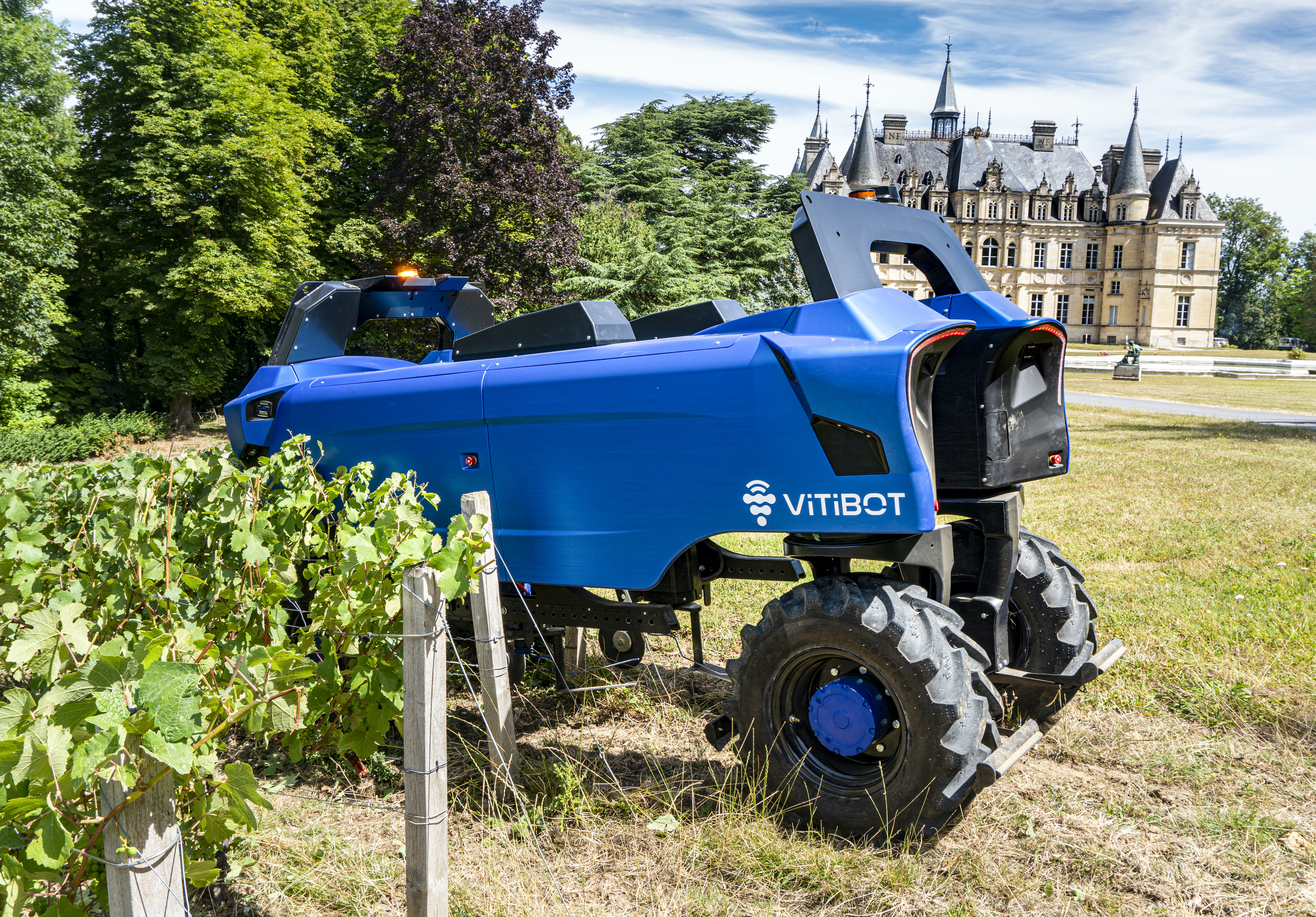
VitiBot is just one of several French startups launching viticulture or agriculture weeding robots. Toulouse-based Naio Technologies has so far sold 15 of its Ted lightweight, multifunctional vine straddling robots. Based in Saint Emillion, in the Bordeaux region, Vitirover has developed a solar-powered grass and weed maintenance robot, while Nantes-based Sitia aims to produce 500 agriculture robots for use in viticulture, arboriculture, or market gardens by 2023.
VitiBot’s robots incorporate a range of tools fixed to the underbelly robot for the different tasks required. They include an electric intervine tool to optimize mechanical weeding under the row; a gyro mower to maintain the grassed belt; and a targeted spraying implement with a recovery panel to limit the risk of off-target spray damage to vineyards, or to human or animal health through airborn propagation.
VitiBot currently produces the Bakus in two models: the smaller Bakus-P75S S which measures 3.5m in length, 1.75m in width and 2m in height, and the larger Bakus-P75L which is 20cm wider and has a height of 2.5m to handle wider, taller vines.
Boxho adds that driving tractors is a physically demanding task that also comes with the risk of accident, especially when working vines situated on a slope. In the Champagne region, where vines are usually spaced just one meter apart, finding enough workers to carry out these tasks is a major challenge.
Industry support
The nationwide lockdown implemented by the French government from late March in response to the pandemic severely curtailed the company’s activities, with staff unable to come to work, he said. Restrictions on movements also limited VitiBot’s ability to carry out information demonstrations around the country with potential clients. However, VitiBot has resumed its activities in full since June, with several demonstrations held in key winemaking regions during the summer months.
When you work with fewer herbicides, you have to spend more time working the soil
“We are an industrial startup developing real technological tools. The young collaborators who formed the initial team had a real ambition for the whole project and so accepted to work for minimum wage [at the time],” Boxho recalls. “And we managed to convince a certain number of investors quite quickly after the success of the prototype model, so these were industrial investors and Champagne houses.”
Significantly for VitiBot, these winemaking powerhouses are investing more than money: the company’s strategic committee includes industry players, apart from senior members of the Bakus development team and VitiBot company managers.
“The strategic committee meets every three months. It is an opportunity to discuss operational needs and developments with these stakeholders — because the Bakus is above all a working machine — but also to have discussions about the market environment. It enables us to refine the project,” Boxho says.
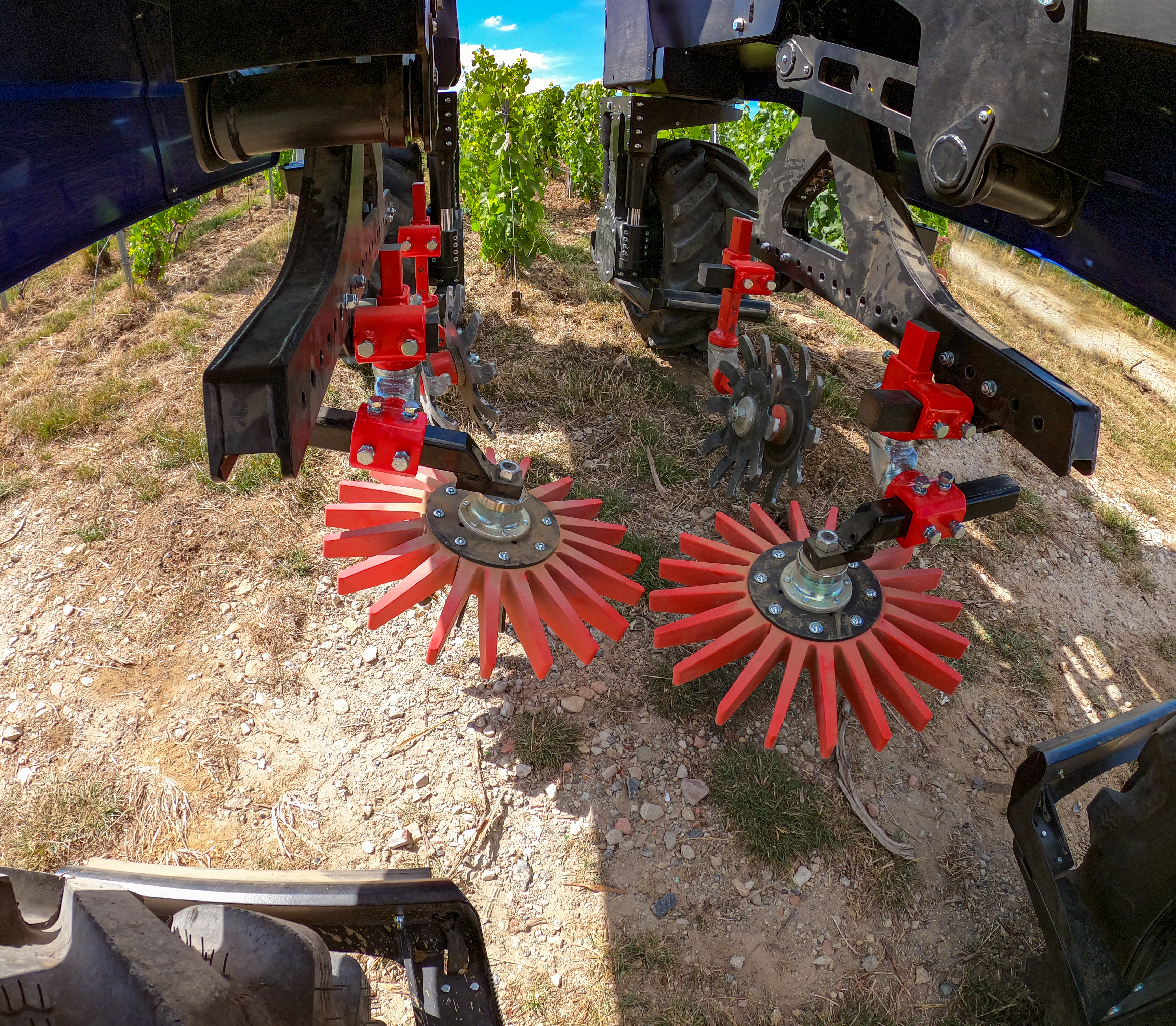
Building durable partnerships
Today, VitiBot is producing the fourth generation of the Bakus robot, which is available in two models to respond to differences in the height and width of grapevines. The company is also working on incorporating data collection capabilities into a future model of the Bakus. By the end of the first quarter 2021, VitiBot expects to have manufactured 22 robots in total, with clients to date spanning France’s key winemaking regions.
VitiBot’s business model is sales-based. A Bakus robot has a starting cost of €110,000, rising depending on the tools and equipment required. Recognizing the relatively high price tag, the company offers financing options and operates a hire-purchase scheme by which clients can rent the machines for a year before purchase. It also offers clients a two-day training program and has a dedicated customer hotline and technical support services.
“We want to build real, durable partnerships,” Boxho says of the reasoning behind the hire-purchase scheme. “We work either directly with the winemakers or through cooperatives, who share the use of the machine. There is also the service model whereby a third party offers the Bakus as a service to winemakers.”
VitiBot has some 50 staff, most of whom are engineers, but including sales and marketing teams. The company plans to begin international commercialization from 2022, for which it expects to employ 10 more staff, in addition to contributing to the creation of around 50 jobs among its suppliers over the next four years.
“We are looking at the regions which are strong in winemaking and have very good markets for us to target. So that’s Italy and Spain, it’s the United States, it’s Australia, for example,” says Boxho. “We estimate the global viticulture tractor market at €1.5bn. So, if we got even just 1% of that, that would be a good project.”
